#Joseph Traoré
Explore tagged Tumblr posts
Text

Songlines' list of 50 Global Guitar Greats features several artists heard on Nonesuch releases over the decades, including Yasmin Williams, Ry Cooder, Taj Mahal, Manuel Galbán, Rokia Traoré, Bombino, Ali Farka Touré, João Gilberto, Joseph Spence, Amadou Bagayoko, and Carlos Paredes. You can see the complete list here.
#songlines#guitar#yasmin williams#ry cooder#taj mahal#manuel galban#rokia traore#bombino#ali farka toure#joao gilberto#joseph spence#amadou & mariam#carlos paredes#nonesuch#nonesuch records
0 notes
Text
2024 olympics France roster
Archery
Baptiste Addis (Manduel)
Thomas Chirault (Corbie)
Jean-Charles Valladont (Besançon)
Caroline Lopez (Nancy)
Lisa Barbelin (Ley)
Amélie Cordeau (Ley)
Athletics
Harold Achi-Yao (Paris)
Dylan Vermont (Paris)
Yann Spillman (Paris)
Félix Bour (Bar-Le-Duc)
Aurélien Quinion (Paris)
Pablo Matéo (Évry)
Ryan Zeze (Louviers)
Gilles Biron (Schœlcher, Martinique)
Corentin Le Clezio (Cergy-Pontoise)
Benjamin Robert (Toulouse)
Gabriel Tual (Villeneuve-Sur-Lot)
Maël Gouyette (Saint-Brieuc)
Azeddine Habz (Paris)
Jimmy Gressier (Boulogne-Sur-Mer)
Hugo Hay (Bressuire)
Yann Schrub (Thionville)
Wilhem Belocian (Les Abymes, Guadalupe)
Raphaël Mohamed (Hagnoudrou)
Alexandre Zhoya (Coutansouze)
Clément Ducos (Bordeaux)
Wilfried Happio (Bourg-La-Reine)
Ludvy Vaillant (Fort-De-France, Martinique)
Nicolas Daru (Grenoble)
Louis Gilavert (Corbeil-Essonnes)
Alex Miellet (Dijon)
Jeff Erius (Strasbourg)
Aymeric Priam (Fort-De-France, Martinique)
Méba-Mickaël Zézé (Saint-Aubin-Lès-Elbeuf)
Téo Andant (Monte Carlo, Monaco)
Thomas Jordier (Noisy-Le-Sec)
Muhammad Kounta (Paris)
Loïc Prévot (Remire-Montjoly, French Guiana)
Fabrisio Saïdy (Paris)
David Sombé (Paris)
Nicolas Navarro (La Crau)
Sidi-Hassan Chahdi (Cluses)
Gabriel Bordier (Laval)
Thibault Collet (La Tronche)
Robin Emig (Gap)
Anthony Ammirati (Grasse)
Tom Campagne (Saint-Jean)
Anael-Thomas Gogois (Amiens)
Jean-Marc Pontvianne (Nîmes)
Yann Chausinand (Clermont-Ferrand)
Teura'itera'i Tupaia (Papeete, French Polynesia)
Tom Reux (Saint-Benoît-Des-Ondes)
Lolassonn Djouhan (Montargis)
Makenson Gletty (Nice)
Marie-Ange Rimlinger (Paris)
Diana Iscaye (Les Ambyes, Guadalupe)
Marjorie Veyssiere (Aurillac)
Meky Woldu (Paris)
Clémence Beretta (Remiremont)
Camille Moutard (Beaune)
Pauline Stey (Saverne)
Gémima Joseph (Kourou, French Guiana)
Hélène Parisot (Saint-Affrique)
Anaïs Bourgoin (Vendôme)
Rénelle Lamote (Coulommiers)
Léna Kandissounon (Aulnay-Sous-Bois)
Agathe Guillemot (Rennes)
Sarah Madeleine (Melun)
Alessia Zarbo (Antibes)
Laëticia Bapté (Fort-De-France, Martinique)
Cyréna Samba-Mayela (Champigny-Sur-Marne)
Shana Grebo (Rennes)
Louise Maravel (Saint-Laurent-Sur-Sèvre)
Alice Finot (Montbéliard)
Flavie Renouard (Caen)
Chloé Galet (Fourmies)
Orlann Oliere (Sens)
Maroussia Paré (Bordeaux)
Sarah Richard-Mingas (Goussainville)
Amandine Brossier (Cholet)
Alexe Déau (La Trinité, Martinique)
Sounkamba Sylla (Laval)
Mélody Julien (Castres)
Méline Rollin (Villers-Semeuse)
Solène Gicquel (Rennes)
Nawal Meniker (Perpignal)
Marie-Julie Bonnin (Bordeaux)
Ninon Chapelle (Metz)
Margot Chevrier (Nice)
Hilary Kpatcha (Toulouse)
Ilionis Guillaume (Montpelier)
Mélina Robert-Michon (Voiron)
Rose Loga (Mainvilliers)
Alexandra Taverniers (Annecy)
Auriana Lazraq-Khlass (Metz)
Badminton
Toma Popov (Fos-Sur-Mer)
Christo Popov (Fos-Sur-Mer)
Lucas Corvée (Alençon)
Ronan Labar (Paris)
Xuefei Qi (Rostrenen)
Margot Lambert (Paris)
Anne Tran (Paris)
Thom Gicquel (Paris)
Delphine Delrue (Sarcelles)
Basketball
Frank Ntilikina (Strasbourg)
Nicolas Batum (Lisieux)
Andrew Albicy (Sèvres)
Guerschon Yabusele (Dreux)
Isaïa Cordinier (Vence)
Evan Fournier (Saint-Maurice)
Nando De Colo (Cholet)
Matthias Lessort (Le Morne-Vert)
Rudy Gobert-Bourgarel (Saint-Quentin)
Victor Wembanyama (La Chesnay)
Matthew Strazel (Bourg-La-Reine)
Bilal Coulibaly (Courbevoie)
Lucas Dussoulier (Libourne)
Jules Rambaut (Reims)
Franck Seguela (Dijon)
Timothé Vergiat (Roanne)
Marine Fauthoux (Pau)
Alexia Chartereau (Le Mans)
Sarah Michel (Ris-Orangis)
Valériane Vukosavljević (Bordeaux)
Iliana Rupert (Sèvres)
Janelle Salaün (Paris)
Dominique Malonga (Villeurbanne)
Gabby Williams (Sparks, Nevada)
Marième Badiane (Brest)
Marine Johannès (Lisieux)
Leïla Lacan (Rodez)
Romane Bernies (Agen)
Myriam Djekoundade (Castres)
Laëtitia Guapo (Clermont-Ferrand)
Hortense Limouzin (Saint-Amand-Les-Eaux)
Marie-Ève Paget (Annecy)
Boxing
Makan Traoré (Royan)
Billal Bennama (Blagnac)
Sof Oumiha (Toulouse)
Djamili-Dini Moindze (Grande-Synthe)
Wassila Lkhadiri (Ajaccio)
Amina Zidani (Le Havre)
Estelle Mossely (Paris)
Davina Michel (Fort-De-France, Martinique)
Breakdancing
Gaëtan Alin (Paris)
Dany Civil (Cayenne, French Guiana)
Carlota Dudek (Cadenet)
Sya Dembélé (Saint-Étienne)
Canoeing
Loïc Léonard (Arras)
Nicolas Gestin (Tréméven)
Titouan Castryck (Saint-Malo)
Boris Neveu (Lourdes)
Maxime Beaumont (Boulogne-Sur-Mer)
Adrien Bart (Orléans)
Eugénie Dorange (Vaires-Sur-Marne)
Axelle Renard (Besançon)
Marjorie Delassus (Pau)
Camille Prigent (Rennes)
Angèle Hug (Les-Ollières-Sur-Eyrieux)
Manon Hostens (Roubaix)
Vanina Paoletti (Nice)
Climbing
Sam Avezou (Igny)
Paul Jenft (Grenoble)
Bassa Mawem (Kourou, French Guiana)
Zélia Avezou (Igny)
Manon Lebon (Saint-Pierre)
Capucine Viglione (Marseille)
Oriane Bertone (Saint-Denis, Réunion)
Cycling
Julian Alaphilippe (Saint-Amand-Montrond)
Christophe Laporte (La Seyne-Sur-Mer)
Valentin Madouas (Brest)
Kévin Vauquelin (Bayeux)
Rayan Helal (Saint-Martin-d'Hères)
Sébastien Vigier (Palaiseau)
Florian Grengbo (Bourg-En-Bresse)
Melvin Landerneau (Le Lamentin, Martinique)
Thomas Boudat (Langon)
Thomas Denis (Bignan)
Valentin Tabellion (Boulogne-Billancourt)
Benjamin Thomas (Lavaur)
Oscar Nilsson-Julien (Aix-En-Provence)
Victor Koretzky (Béziers)
Jordan Sarrou (Saint-Étienne)
Anthony Jeanjean (Montpelier)
Sylvain André (Cavaillon)
Joris Daudet (Saintes)
Romain Mahieu (Lille)
Audrey Cordon-Ragot (Pontivy)
Juliette Labous (Roche-Lez-Beaupré)
Victoire Berteau (Lambres-Lez-Douai)
Mathilde Gros (Lens)
Taky Kouamé (Crétei)
Marion Borras (Pontcharra)
Clara Copponi (Aix-En-Provence)
Marie Le Net (Pontivy)
Valentine Fortin (Toulouse)
Pauline Ferrand-Prévot (Reims)
Loana Lecomte (Annecy)
Laury Perez (Béziers)
Axelle Étienne (Vaujours)
Diving
Gwendal Bisch (Strasbourg)
Jules Bouyer (Annecy)
Alex Jandard (Écully)
Loïs Szymczak (Paris)
Roger Hunt (Southampton, U.K.)
Naïs Gillet (Dieppe)
Jade Gillet (Dieppe)
Emily Hallifax (Nice)
Juliette Landi (Houston, Texas)
Equestrian
Gireg Le Coz (Paris)
Alexandre Ayache (Lantosque)
Corentin Pottier (Rueil-Malmaison)
Karim Laghouag (Roubaix)
Stéphane Landois (Selles)
Nicolas Touzaine (Angers)
Simon Delestre (Solgne)
Julien Épaillard (Cherbourg)
Olivier Perreau (Saulieu)
Kevin Staut (Le Chesnay)
Anne-Sophie Serre (Avignon)
Pauline Basquin (Rennes)
Fencing
Luidgi Midelton (Les Abymes, Guadalupe)
Paul Allègre (Nevers)
Yannick Borel (Pointe-À-Pitre, Guadalupe)
Romain Cannone (New York, New York)
Enzo Lefort (Les Abymes, Guadalupe)
Maxime Pauty (Clamart)
Julien Mertine (Saint-Germain-En-Laye)
Maximilien Chastanet (Le Havre)
Boladé Apithy (Dijon)
Sébastien Patrice (Marseille)
Jean-Philippe Patrice (Marseille)
Maxime Pianfetti (Tarbes)
Eva Lacheray (Montbéliard)
Sarah Noutcha (Strasbourg)
Marie-Florence Candassamy (Paris)
Auriane Mallo-Breton (Lyon)
Coraline Vitalis (Le Gosier, Guadalupe)
Alexandra Louis-Marie (Fort-De-France, Martinique)
Pauline Ranvier (Paris)
Ysaora Thibus (Les Abymes, Guadalupe)
Anita Blaze (Petit-Bourg, Guadalupe)
Sara Balzer (Strasbourg)
Manon Apithy-Brunet (Dijon)
Cécilia Berder (Quimper)
Field Hockey
Arthur Thieffry (Villeneuve-d'Ascq)
Gaspard Xavier (Cambrai)
Lucas Montécot (Chatenay)
Chris Peters-Deutz (Verviers)
Brieuc Delemazure (Amiens)
Mattéo Desgouillons (Lille)
Simon Martin-Brisac (Paris)
Blaise Rogeau (Paris)
Viktor Lockwood (Calais)
Noé Jouin (Paris)
Amaury Bellenger (Amiens)
Gaspard Baumgarten (Lyon)
François Goyet (Lille)
Eliot Curty (Paris)
Étienne Tynevez (Lille)
Victor Charlet (Paris)
Charles Masson (Paris)
Timothée Clément (Paris)
Mathilde Duffrène (Valenciennes)
Eve Verzura (Lille)
Inès Lardeur (Lille)
Lucie Ehrmann (Boredeaux)
Albane Garot-Loussif (Liège, Belgium)
Delfina Gaspari (Maisons-Laffitte)
Tessa-Margot Schubert (Essen, Germany)
Mathilde Petriaux (Mont-Saint-Aignan)
Catherine Clot (Amsterdam, The Netherlands)
Emma Ponthieu (Lille)
Mickaela Lala (Paris)
Paola Le Nindre (Le Chesnay)
Yohanna Lhopital (Lyon)
Philippine Delemazure (Valenciennes)
Gabrielle Verrier (Rouen)
Stéphanoise Arnaud (Firminy)
Guusje Van Bolhuis (Leiden, The Netherlands)
Golf
Victor Perez (Dundee, U.K.)
Matthieu Pavon (Médoc)
Céline Boutier (Montrouge)
Perrine Delacour (Laon)
Gymnastics
Samir Aït-Saïd (Champigny-Sur-Marne)
Marine Boyer (Saint-Benoît, Réunion)
Mélanie De Jesus (Houston, Texas)
Coline Devillard (Bois De Vincennes)
Morgane Osyssek-Reimer (Bois De Vincennes)
Ming Van Eijken (Saint-Étienne)
Hélène Karbanov (Calais)
Aïnhoa Dot-Espinosa (Paris)
Manelle Inaho (Paris)
Celia Joseph-Noel (Paris)
Justine Lavit (Tarbes)
Lozea Vilarino (Paris)
Pierre Gouzou (Meaux)
Léa Labrousse (Rennes)
Handball
Aymeric Minne (Melun)
Yanis Lenne (Colmar)
Nedim Remili (Créteil)
Elohim Prandi (Istres)
Melvyn Richardson (Marseille)
Dika Mem (Paris)
Nicolas Tournat (Niort)
Vincent Gérard (Woippy)
Nikola Karabatić (Strasbourg)
Luka Karabatić (Strasbourg)
Ludovic Fabregas (Perpignan)
Hugo Descat (Paris)
Valentin Porte (Versailles)
Dylan Nahi (Paris)
Karl Konan (Abidjan, Côte d'Ivoire)
Rémi Desbonnet (Montpellier)
Laura Glauser (Besançon)
Méline Nocandy (Saint-Claude, Guadalupe)
Alicia Toublanc (Saint-Brieuc)
Chloé Valentini (Morteau)
Coralie Lassource (Maisons-Laffitte)
Grâce Zaadi-Deuna (Courcouronnes)
Cléopatre Darleux (Wittenheim)
Laura Flippes (Strasbourg)
Orlane Kanor (Les Abymes, Guadalupe)
Tamara Horaček (Metz)
Pauletta Foppa (Amilly)
Estelle Nze-Minko (Saint-Sébastien-Sur-Loire)
Oriane Ondono (Alfortville)
Lucie Granier (Marseille)
Sarah Bouktit (Mont-Saint-Martin)
Léna Grandveau (Beaune)
Hatadou Sako (Tournan-En-Brie)
Judo
Luka Mkheidze (Sucy-En-Brie)
Walide Khyar (Bondy)
Jean-Benjamin Gaba (Sèvres)
Alpha Djalo (Paris)
Maxime-Gaël Ngayap-Hambou (Asnières-Sur-Seine)
Aurélien Diesse (Paris)
Teddy Riner (Paris)
Shirine Boukli (Aramon)
Amandine Buchard (Noisy-Le-Sec)
Sarah-Léonie Cysique (Sarcelles)
Clarisse Agbegnenou (Rennes)
Marie-Eve Gahié (Paris)
Madeleine Malonga (Soisy-Sous-Montmorency)
Romane Dicko (Clamart)
Pentathlon
Jean-Baptiste Mourcia (Pertuis)
Valentin Prades (Cannes)
Élodie Clouvel (Saint-Priest-En-Jarez)
Marie Oteiza (Mont-De-Marsan)
Rowing
Hugo Beury (Paris)
Ferdinand Ludwig (Voiron)
Benoît Brunet (Tourcoing)
Téo Rayet (Libourne)
Hugo Boucheron (Lyon)
Matthieu Androdias (La Rochelle)
Guillaume Turlan (Bordeaux)
Thibaud Turlan (Bordeaux)
Valentin Onfroy (Verdun)
Emma Lunatti (Saint-Martin-d'Hères)
Élodie Ravera-Scaramozzino (Nice)
Claire Bové (Aubergenville)
Laura Tarantola (Annemasse)
Rugby
Varian Pasquet (Paris)
Andy Timo (Massy)
Rayan Rebbadj (Martigues)
Théo Forner (Perpignan)
Stephen Parez-Edo (Madrid, Spain)
Paulin Riva (Auch)
Jefferson-Lee Joseph (Duras)
Antoine Zeghdar (Monte Carlo, Monaco)
Aaron Grandidier-Nkanang (Pau)
Jean-Pascal Barraque (Le Chesnay)
Antoine Dupont (Castelnau-Magnoac)
Jordan Sepho (Saint-Denis, Réunion)
Nelson Épée (Toulouse)
Anne-Cécile Durbant (Colombes)
Lili Dezou (Toulouse)
Caroline Drouin (Auray)
Camille Grassineau (Bergerac)
Joanna Grisez (Paris)
Chloé Jacquet (Viriat)
An Jason (Paris)
Carla Neisen (Bugue)
Louise Noel-Rivier (Béziers)
Séraphine Okemba (Dreux)
Chloé Pelle (Paris)
Yolaine Yengo (Mare)
Sailing
Axel Mazella (Toulon)
Clément Pequin (La Rochelle)
Erwan Fischer (Saint-Nazaire)
Tim Mourniac (Quilberon)
Nico Goyard (Lorient
Jean-Baptiste Bernaz (Fréjus)
Jérémie Mion (Paris)
Louise Cervera (Cannes)
Louise Berthomieu (Nantes)
Hélène Noesmoen (Les-Sables-d'Olonne)
Lauriane Nolot (Camps-La-Source)
Charline Picon (Royan)
Sarah Steyaert (Bordeaux)
Camille Klinger (Harfleur)
Shooting
Romain Aufrère (Saint-Denis, Réunion)
Lucas Kryzs (Le Perreux-Sur-Marne)
Florian Fouquet (Talence)
Sébastien Guerrero (Grenoble)
Clément Bessaguet (Montpellier)
Jean Quiquampoix (Paris)
Éric Delaunay (Saint-Lô)
Manon Herbulot (Noise-Sur-Oise)
Judith Gomez (Toulouse)
Océanne Muller (Schiltigheim)
Camille Jedrzejewski (Compiègne)
Mathilde Lamolle (Aubagne)
Carole Cormenier (Limoges)
Mélanie Couzy (Romorantin-Lanthenay)
Lucie Anastassiou (La Rochelle)
Skateboarding
Joseph Garbaccio (La Havre)
Vincent Matheron (Marseille)
Aurélien Giraud (Lyon)
Vincent Milou (Tarnos)
Émilie Alexandre (Marseille)
Louise-Aina Taboulet (Leucate)
Lucie Schoonheere (Paris)
Soccer
Obed Nkambadio (Paris)
Costello Lukeba (Lyon)
Adrien Truffert (Saint-Priest)
Loïc Badé (Sèvres)
Kiliann Sildillia (Montigny-Lès-Metz)
Manu Koné (Colombes)
Michael Olise (London, U.K.)
Maghnes Akilouche (Tremblay-En-France)
Arnaud Kalimuendo-Muinga (Suresnes)
Alexandre Lacazette (Lyon)
Désiré Doué (Angers)
Enzo Millot (Lucé)
Joris Chotard (Orange)
Jean-Philippe Mateta (Sevran)
Banzouzi Locko (Ivry-Sur-Seine)
Guillaume Restes (Montaudran)
Soungoutou Magassa (Stains)
Mathis Cherki (Lyon)
Chrislain Matsima (Nanterre)
Andy Diouf (Nanterre)
Johann Lepenant (Granville)
Constance Picaud (Challans)
Maëlle Lakrar (Orange)
Wendie Renard (Lyon)
Estelle Cascarino (Saint-Priest)
Delphine Cascarino (Saint-Priest)
Élisa De Almeida (Châtenay-Malabry)
Amadine Henry (Lille)
Sakina Karchaoui (Miramas)
Onema Geyoro (Orléans)
Eugénie Le Sommer-Dariel (Grasse)
Kadidiatou Diani (Ivry-Sur-Seine)
Marie-Antoinette Katoto (Colombes)
Selma Bacha (Lyon)
Sandie Toletti (Bagnols-Sur-Cèze)
Kenza Dali (Sainte-Colombe)
Pauline Payraud-Magnin (Lyon)
Sandy Baltimore (Colombes)
Griedge Mbock-Bathynka (Brest)
Vicki Bècho-Desbonne (Montreuil)
Ève Périsset (Saint-Priest)
Surfing
Jean Duru (Ondres)
Kauli Vaast (Teahupo'o, French Polynesia)
Johanne Defay (Saint-Denis, Réunion)
Vahiné Fierro (Teahupo'o, French Polynesia)
Swimming
Pacome Bricout (Cannes)
Guillaume Guth (Le Chesnay)
Wessam-Amazigh Yebba (Poitiers)
Roman Fuchs (Dijon)
Yann Le Goff (Quimper)
Maxime Grousset (Nouméa, New Caledonia)
Florent Manaudou (Villeurbanne)
Rafael Fente-Damers (Houston, Texas)
David Aubry (Saint-Germain-En-Laye)
Damien Joly (Ollouiles)
Yohann Ndoye-Brouard (Chambéry)
Mewen Tomac (Évreux)
Clément Secchi (Aix En Provence)
Léon Marchand (Toulouse)
Hadrien Salvan (Paris)
Antoine Viquerat (Boulogne-Billancourt)
Marc-Antoine Olivier (Denain)
Logan Fontaine (Argentan)
Laelys Alavez (Quincy-Sous-Sénart)
Ambre Esnault (Hyères)
Romane Lunel (Alençon)
Laura Gonzalez (Toulouse)
Manon Disbeaux (Toulouse)
Eve Planeix (Clermont-Ferrand)
Anastasia Bayandina (Krasnoyarsk, Russia)
Laura Tremble (Compiègne)
Charlotte Tremble (Compiègne)
Pauline Mahieu (Villenueve-d'Ascq)
Marina Jehl (Colmar)
Mary-Ambre Moluh (Champigny-Sur-Marne)
Lilou Ressencourt (Lannemezan)
Béryl Gastaldello (Marseille)
Mélanie Henique (Amiens)
Marie Wattel (Lille)
Anastasiia Kirpichnikova (Martigues)
Emma Terebo (Nouméa, New Caledonia)
Charlotte Bonnet (Enghien-Les-Bains)
Lison Nowaczyk (Auchel)
Lucile Tessariol (Bordeaux)
Assia Touati (Sarreguemines)
Caroline Jouisse (Saint-Mandé)
Océane Cassignol (Béziers)
Table tennis
Jules Rolland (Paris)
Alex Lebrun (Montpellier)
Félix Lebrun (Montpellier)
Simon Gouzy (Toulouse)
Prithika Pavade (Le Bourget)
Yuan Jia (Cholet)
Charlotte Lutz (Hochfelden)
Audrey Zarif (Saint-Denis)
Taekwondo
Cyrien Ravet (Lyon)
Souleyman Alaphilippe (Argenteuil)
Magda Wiet-Hénin (Nancy)
Althéa Laurin (Saint-Denis)
Tennis
Arthur Fils (Bondoufle)
Ugo Humbert (Metz)
Gaël Monfils (Geneva, Switzerland)
Corentin Moutet (Boulogne-Billancourt)
Édouard Roger-Vasselin (Boulogne-Billancourt)
Clara Burel (Perros-Guirec)
Caroline Garcia (Lyon)
Varvara Gracheva (Paris)
Diane Parry (Boulogne-Billancourt)
Triathlon
Léo Bergère (Le Pont-De-Beauvoisin)
Dorian Coninx (Échirolles)
Pierre Le Corre (Vannes)
Cassandre Beaugrand (Livry-Gargan)
Emma Lombardi (Chambéry)
Léonie Périault (Vélizy-Villacoublay)
Volleyball
Arnaud Gauthier-Rat (Saint-Maurice)
Youssef Krou (Toulouse)
Rémi Bassereau (Villeneuve-Saint-Georges)
Julien Lyneel (Montpellier)
Barthélémy Chinenyeze (Coudekerque-Branche)
Jenia Grebennikov (Rennes)
Jean Patry (Montpellier)
Ben Toniutti (Mulhouse)
Kévin Tillie (Cagnes-Sur-Mer)
Earvin N'Gapeth (Fréjus)
Antoine Brizard (Poitiers)
Nicolas Le Goff (Paris)
Trévor Clévenot (Royan)
Yacine Louati (Tourcoing)
Théo Faure (Pessac)
Quentin Jouffroy (Grenoble)
Lézana Placette (Toulouse)
Alexia Richard (Toulouse)
Aline Chamereau (Toulouse)
Clemence Vieira (Toulouse)
Héléna Cazaute (Narbonne)
Amadine Giardino (La Seyne-Sur-Mer)
Christina Bauer (Pfastatt)
Iman Ndiaye (Plano, Texas)
Nina Stojiljković (Paris)
Lucille Gicquel (Rennes)
Amandha Sylves (Baie-Manhout, Guadalupe)
Léandra Olinga-Andela (Évreux)
Émilie Respaut (Saint-Raphaël)
Amélie Rotar (Martigues)
Halimatou Bah (Épinay-Sous-Sénart)
Juliette Gelin (Montpellier)
Water polo
Clément Dubois (Compiègne)
Alexandre Bouet (Montpellier)
Thomas Vernoux (Marseille)
Romain Marion-Vernoux (Marseille)
Emil Bjorch (Slagelse, Denmark)
Pierre-Frédéric Vanpeperstraete (Marcq-En-Barœul)
Enzo Nardon (Saint-Jean-d'Angély)
Hugo Fontani (Nice)
Rémi Saudadier (Dijon)
Ugo Crousillat (Marseille)
Enzo Khasz (Sète)
Mehdi Marzouki (Noisy-Le-Sec)
Michaël Bodegas (La Seyne-Sur-Mer)
Valentine Heurteaux (Marseille)
Aurélie Battu (Limoges)
Audrey Daule (Oyonnax)
Pasiphaé Martineaud-Peret (Paris)
Mia Ryclaw (Walnut, California)
Lara Andres (Mulhouse)
Camélia Bouloukbachi (Paris)
Louise Guillet (Limoges)
Hertzka Orsolya (Budapest, Hungary)
Juliette Dhalluin (Mulhouse)
Ema Vernoux (Marseille)
Camille Radosavljevic (Mulhouse)
Tiziana Raspo (Nice)
Weightliftng
Bernardin Matam (Yaoundé, Cameroon)
Romain Imadouchène (Saint-Pol-Sur-Mer)
Dora Tchakounté (Yaoundé, Cameroon)
Marie Fegue (Yaoundé, Cameroon)
Wrestling
Mamadassa Sylla (Paris)
Améline Douarre (Le Creusot)
Koumba Larroque (Arpajon)
#Sports#National Teams#France#Celebrities#Races#French Guiana#Monaco#Basketball#Nevada#Fights#Boxing#Boats#Animals#Hockey#Germany#The Netherlands#Golf#U.K.#Texas#Cote d'Ivoire#Spain#Soccer#Russia#Tennis#Switzerland#Denmark#Hungary#Cameroon
0 notes
Text

Ibrahim Traoré, né le 14 mars 1988 à Kera, dans la commune de Bondokuy (Burkina Faso), est un militaire et homme d'État burkinabè, chef d'État du Burkina Faso depuis le 30 septembre 2022. Au sein de l'armée, il porte le grade de capitaine. Le 30 septembre 2022, il renverse le lieutenant-colonel Paul-Henri Sandaogo Damiba par un coup d'État et prend la tête du Mouvement patriotique pour la sauvegarde et la restauration. Âgé alors de 34 ans, il est le plus jeune chef d'État au monde. Il a fréquenté le lycée mixte d’Accart-ville de Bobo-Dioulasso, où il obtient le baccalauréat en 2006. Il est diplômé en géologie à l’université de Ouagadougou. Il a été durant ses études militant de l’Association nationale des étudiants du Burkina (ANEB), une organisation estudiantine d’inspiration marxiste. Traoré n'est pas issu du Prytanée militaire de Kadiogo (PMK), contrairement à son prédécesseur Damiba et bon nombre d'officiers burkinabè. Après des études universitaires en géologie à l'université Joseph Ki-Zerbo à Ougadougou, Ibrahim Traoré intègre l'armée en 2010. Il fait sa formation à l'Académie militaire Georges Namoano, une école de formation d'officiers basée à Pô, où il sort vice-major de sa promotion[6],[5]. Le jeune soldat va rapidement gravir les échelons militaires. En 2012, il devient sous-lieutenant. En 2014, il passe au grade de lieutenant avant d'être promu capitaine en 2020. En mars 2022, il est nommé chef d'artillerie (RA) du dixième régiment de commandement d'appui et de soutien (10e RCAS) basé à Kaya par l'ex-président Damiba. Le capitaine Traoré a participé à plusieurs opérations militaires dans la lutte contre le terrorisme, notamment à Djibo, où il était placé sous les ordres du lieutenant-colonel Damiba, alors commandant du groupement des forces armées antiterroristes en 2017. Il a également pris part à l'opération Otapuanu en 2019 et a aussi servi au sein du détachement militaire de Markoye au Sahel. Ibrahim Traoré prend le pouvoir par un coup d'État le 30 septembre 2022, après avoir annoncé la destitution de Damiba. Il s'agit du deuxième putsch que vit le pays cette année. Le capitaine Traoré fait partie des officiers qui ont participé au coup d'État qui a conduit le lieutenant-colonel Damiba, président du MPSR, au pouvoir le 24 janvier 2022. Ibrahim Traoré en octobre 2022. En raison de la situation sécuritaire dégradée et du non-respect des engagements pris lors premier coup d'État, ces officiers ont décidé de destituer le président Damiba le 30 septembre. Ibrahim Traoré est désormais à la tête du MPSR. Ce coup d'État fait suite à plusieurs attaques terroristes meurtrières, particulièrement celle de Gaskindé, au nord du Burkina Faso, où un convoi de ravitaillement est tombé dans une embuscade terroriste. Selon le bilan officiel, on dénombre 11 militaires tués et plusieurs civils portés disparus. Le 6 octobre, un acte fondamental rétablit la Constitution et déclare Traoré chef de l'État. Assurant expédier les affaires courantes, Traoré annonce la désignation d'un président de la Transition, civil ou militaire, par des assises le 14 octobre 2022. Ses partisans organisent des manifestations appuyant sa nomination à la tête de l'État, ce qui conduit à sa désignation à la tête de la transition en sa qualité de président du MPSR. Il est investi le 21 octobre président de la Transition par le Conseil constitutionnel. Le 3 février 2023, Ibrahim Traoré annonce de grandes offensives à venir contre les djihadistes, et appelle au soutien populaire. En avril 2023, il décrète la mobilisation générale. En mai, il évoque les pays « amis » avec lesquels il construit ou se renforce une coopération militaire : la Russie, dont la milice paramilitaire Wagner pourrait être présente au Burkina Faso, la Turquie, qui lui fournit des drones Bayraktar TB2, ainsi que la Corée du Nord, qu'il envisage également comme un fournisseur d'armes[30]. Pour l’heure, le gouvernement privilégie le recours à ses propres forces dans la lutte antidjihadiste et ne semble pas avoir demandé l'aide des Russes de Wagner.
Grâce à son âge, son expérience du terrain et son langage, Ibrahim Traoré séduit auprès de la jeunesse, qui compte pour plus de 70 % de la population mais reste largement sous-représentée au sein des institutions politiques. Il invoque régulièrement les idéaux de Thomas Sankara lors de ses discours, tels que la lutte pour la souveraineté nationale et le rejet de l'impérialisme Reste qu'après sa prise de pouvoir, Traoré est, selon de nombreux interlocuteurs de l'AFP à Ouagadougou, porteur d'un nouvel espoir, un nouveau départ dans un pays qui ne cesse de s'enfoncer dans la guerre sahélienne depuis 2015. Au Deuxième Sommet “Russie-Afrique” qui s’est tenu le 28 juillet, le Président Ibrahim Traoré a brillamment démontré sa clairvoyance en rendant un vibrant hommage aux peuples africains. reconnaissant leur rôle essentiel dans la résilience de l’Afrique. Il a affiché une assurance en l’avenir du continent, en insistant sur la nécessité de surmonter les défis et les obstacles auxquels l’Afrique est confrontée. Cette déclaration audacieuse témoigne de sa confiance dans les capacités des Africains à relever les défis et à construire un meilleur avenir pour eux-mêmes et les générations futures. En mettant en avant les peuples africains et en leur rendant hommage, il a montré sa vision pour un continent uni et prospère, capable de relever les défis et de saisir les opportunités. https://savoirentreprendre.net/?p=4057&feed_id=7240
0 notes
Text
On this day in Wikipedia: Tuesday, 23rd January
Welcome, bun venit, ողջու՜յն (voġčuyn), välkommen 🤗 What does @Wikipedia say about 23rd January through the years 🏛️📜🗓️?

23rd January 2022 🗓️ : Event - Paul-Henri Sandaogo Damiba Mutinying Burkinabè soldiers led by Paul-Henri Sandaogo Damiba depose and detain President Roch Marc Christian Kaboré amid widespread anti-government protests. "Paul-Henri Sandaogo Damiba (French: [pɔl ɑ̃ʁi sɑ̃daɔɡɔ damiba]; born January 1981) is a Burkinabé military officer who served as interim president of Burkina Faso from 31 January 2022 to 30 September 2022, when he was removed in a coup d'état, by his own military colleague Ibrahim Traoré. Damiba had..."

Image by Lamine Traoré (VOA)
23rd January 2019 🗓️ : Death - Aloysius Pang Aloysius Pang, Singaporean actor (b. 1990) "Aloysius Pang Wei Chong (24 August 1990 – 24 January 2019) was a Singaporean actor managed under NoonTalk Media, best known for his involvement in multiple Mediacorp dramas. Pang died on 24 January 2019 at 1:45am NZDT (23 January 2019 at 8:45pm SST) due to serious crush injuries sustained from a..."
23rd January 2014 🗓️ : Death - Yuri Izrael Yuri Izrael, Russian meteorologist and journalist (b. 1930) "Yuri Antonievich Izrael (Russian: Юрий Антониевич Израэль; 15 May 1930, Tashkent – 23 January 2014, Moscow) was a Soviet and Russian meteorologist. He served as the vice-chairman of the Intergovernmental Panel on Climate Change (IPCC) until September 2008, when the new bureau was elected. He was the..."
23rd January 1974 🗓️ : Birth - Richard T. Slone Richard T. Slone, English painter "Richard T. Slone is a self-taught artist residing in the United States. He was born in 1974 in Newton-in-Furness, Lancashire, a northern English town. His work has been commissioned and purchased by many global celebrities, as well as used for large scale events all over the world.Slone's art has..."

Image licensed under CC BY-SA 3.0? by The original uploader was Artdealer1935 at English Wikipedia.
23rd January 1924 🗓️ : Birth - Frank Lautenberg Frank Lautenberg, American soldier, businessman, and politician (d. 2013) "Frank Raleigh Lautenberg (; January 23, 1924 – June 3, 2013) was an American businessman and Democratic Party politician who served as United States Senator from New Jersey from 1982 to 2001, and again from 2003 until his death in 2013. He was originally from Paterson, New Jersey. Lautenberg was..."
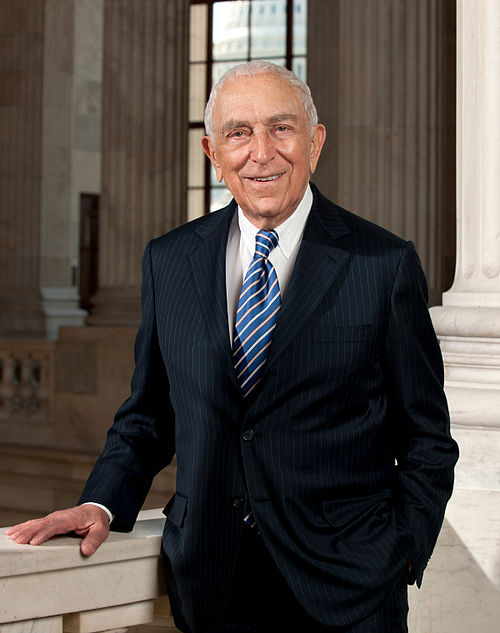
Image by United States Senate
23rd January 1820 🗓️ : Death - Prince Edward, Duke of Kent and Strathearn Prince Edward, Duke of Kent and Strathearn (b. 1767) "Prince Edward, Duke of Kent and Strathearn, (Edward Augustus; 2 November 1767 – 23 January 1820) was the fourth son and fifth child of King George III and Queen Charlotte. His only child, Victoria, became Queen of the United Kingdom 17 years after his death. Prince Edward was created Duke of Kent..."

Image by William Beechey
23rd January 🗓️ : Holiday - Christian feast day: Marianne of Molokai "Marianne Cope, TOSF, also known as Saint Marianne of Molokaʻi (January 23, 1838 – August 9, 1918), was a German-born American religious sister who was a member of the Sisters of St Francis of Syracuse, New York, and founding leader of its St. Joseph's Hospital in the city, among the first of 50..."
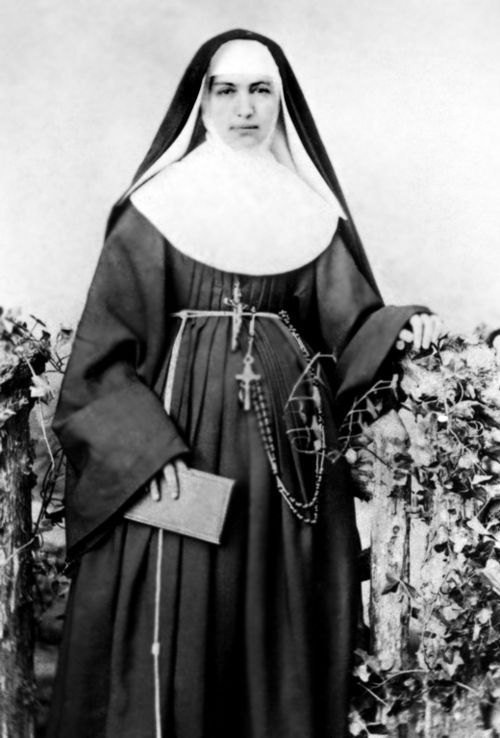
Image by Unknown authorUnknown author
0 notes
Text
Urbanworld Film Festival Announces 2023 Lineup

The 27th annual Urbanworld Film Festival's lineup has been announced for the event taking place the first week of November. The five-day occasion is November 1-5 at AMC 34th Street and the SVA Theatre in New York City. The schedule includes the world premiere of A Wu-Tang Experience: Live At Red Rocks Amphitheatre directed by Rza and Gerald Barclay. A conversation with Marvel Studios' The Marvels writer/director and Urbanworld album Nia Acosta is also planned. HBO returns as a Founding Partner and Warner Brothers Discovery is the Prestige Partner.
Stand Up & Shout: Songs from a Philly High School, an HBO Documentary Films feature, from director Amy Schatz and executive produced by Mike Jackson, John Legend and Ty Stiklorius of Get Lifted Film Co. will screen. Lawman: Bass Reeves, starring and executive produced by David Oyelowo about the first Black US Marshal is scheduled for viewing. Maxine's Baby: The Tyler Perry Story will be presented by Amazon Prime and National Geographic Documentary Films is having a youth screening of The Space Race directed by Urbanworld alum Lisa Cortés (Little Richard I Am Everything) and Diego Hurtado de Mendoza.
The work of more Urbanworld alums will be highlighted with To Live And Let Die starring Amin Joseph and Omari Hardwick; Young. Wild. Free. directed by Thembi Banks with Sanaa Lathan and Mike Epps; and Sira, a Berlinale audience winner directed by Apolline Traoré.
ESPN is presenting Black Girls Play from documentary team Joe Brewster and Michéle Stephenson. Disney+ is showcasing six short films from its Disney + Launchpad incubator program of filmmakers including The Ghost, directed by Erica Eng; Black Belts, directed by Spencer Glover; Beautiful, FL, directed by Gabriela Ortega; The Roof, directed by Alexander Bocchieri; Maxine, written and directed by Niki Ang and Project CC, directed by Cashmere Jasmine.
The almost 100 titles comprises shorts from several known artists including Yvonne Orji's directing debut with Jamaal and Zainab Jah's first film Reunion. Executive producer, Urbanworld alum and writer Nelson George will present Flower, a short film about ballerina Misty Copeland. Benny Boom's A Love Letter To Hip-Hop starring Tariq Trotter aka Black Thought and Part of Me: Anuar Khalifi by Yasiin Bey starring Yasiin Bey (fka Mos Def) are two of the music-oriented titles.
To purchase tickets and passes, visit urbanworld.org.
2023 Urbanworld International Film Festival Lineup
Spotlight Presentations
Lawmen: Bass Reeves – Created by Chad Feehan (Presented by Paramount+)
Maxine's Baby: The Tyler Perry Story – Directed by Gelila Bekele and Armani Ortiz (Presented by Prime Video)
Stand Up & Shout: Songs from a Philly High School – Directed by Amy Schatz (Presented by HBO Documentary Films)
The Space Race – Directed by Diego Hurtado de Mendoza and Lisa Cortés (Presented by National Geographic Documentary Films)
U.S./World Cinema Narrative Features
Chronicles of a Wandering Saint (Argentina) – Directed by Tomás Gómez Bustillo (New York Premiere)
Frybread Face and Me – Directed by Billy Luther (New York Premiere)
INKY PINKY PONKY (New Zealand) – Directed by Damon Fepuleai, Ramon TeWake (U.S. Premiere)
To Live and Die and Live – Directed by Qasim Basir
Young. Wild. Free. – Directed by Thembi Banks (New York Premiere)
Sira (Burkina Faso) – Directed by Apolline Traoré (U.S. Premiere)
Documentary Features
A Wu-Tang Experience: Live at Red Rocks Amphitheatre – Directed by Gerald K. Barclay and The RZA (World Premiere)
Bike Vessel – Directed by Eric D. Seals (New York Premiere)
Black Barbie: A Documentary – Directed by Lagueria Davis (New York Premiere)
Brief Tender Light (Ghana/USA) – Directed by Arthur Musah (New York Premiere)
Disney Launchpad Shorts (Presented by Disney+)
Beautiful, FL – Directed by Gabriela Ortega
Black Belts – Directed by Spencer Glover
Maxine – Directed by Niki Ang
Project CC – Directed by Cashmere Jasmine
The Ghost – Directed by Erica Eng
The Roof – Directed by Alexander Bocchieri
POV Showcase (Presented by WNET)
By Way of Canarsie – Directed by Emily Packer and Lesley Steele
Freshwater – Directed by dream hampton
Sol in the Garden – Directed by Emily Cohen Ibañez and Débora Souza Silva
Still Waters – Directed by Aurora Brachman
The Dream of a Horse (Iran) – Directed by Marjan Khosravi (New York Premiere)
U.S. And World Narrative Shorts
A Version – Directed by Asad Farooqui (New York Premiere)
August Visitor – Directed by Ifeyinwa Arinze
Becoming – Directed by Tramaine Raphael Gray
Children of Light (Korea/USA) – Directed by Minkyu Kang (New York Premiere)
Choices – Directed by Justin Luis Denis (World Premiere)
Cousins – Directed by Karina Dandashi
Cut Me If You Can – Directed by Nicolas Polixene and Sylvain Loubet (New York Premiere)
Death & Ramen – Directed by Tiger Ji
Don't Touch My Hair – Directed by Matthew Law (New York Premiere)
Don't Wait Up For Me – Directed by Alain Alfaro (New York Premiere)
ExpoZure – Directed by Kimson Albert (World Premiere)
Hématome (Belgium) – Directed by Babetida Sadjo
Homing – Directed by Ricardo Varona (New York Premiere)
House Party (United Kingdom) – Directed by William Alexander Boyd III (U.S. Premiere)
Incomplete – Directed by Zoey Martinson
I Held Him – Directed by Hans Augustave
JAMAAL – Directed by Yvonne Orji (World Premiere)
Jerome – Directed by Gianfranco Fernández-Ruiz (New York Premiere)
LOOK BACK AT IT – Directed by Felicia Pride
Lunchbox – Directed by Anne Hu
Magic Ring – Directed by Alex Ashe
My Two Left Feet – Directed by Damian Gonzalez (U.S. Premiere)
October Mourning – Directed by Frederick Thornton (New York Premiere)
Reunion – Directed by Zainab Jah and Tim Naylor (New York Premiere)
Spaceship – Directed by Jorge G. Camarena (New York Premiere)
The Burden – Directed by Tish Arana (New York Premiere)
The Fore-men (Canada) – Directed by Adrian Bobb (East Coast Premiere)
The Old Young Crow (Japan) – Directed by Liam LoPinto (New York Premiere)
TikTok Challenged – Directed by Ivan Rome
YELLOW (United Kingdom) – Directed by ELHAM EHSAS (East Coast Premiere)
Documentary Shorts
Black Girls Play: The Story of Hand Games – Directed by Joe Brewster and Michèle Stephenson (Presented by ESPN Films)
Duckworthy – Directed by M.G. Evangelista (New York Premiere)
I Was a Soul Train Dancer – Directed by Timiza Sanyika (New York Premiere)
Merman – Directed by Sterling Hampton IV
PART OF ME - Anuar Khalifi BY Yasiin Bey (Spain) – Directed by Jordi Esgleas Marroi (New York Premiere)
OVER THE WALL – Directed by KRYSTAL TINGLE
SLICE – Directed by Zaire Love (New York Premiere)
The Big Idea: Birth Without Bias – Directed by Sarah Klein, Tom Mason (New York Premiere)
Things Long Left Unsaid – Directed by Antonia Thornton (New York Premiere)
WA GUEJJ GUI - OCEAN PEOPLE – Directed by Clé Hunnigan (World Premiere)
Animation Shorts
Bridges – Directed by Jonathan Davenport (World Premiere)
BURNING RUBBER – Directed by Christopher Fequiere and Dara King (New York Premiere)
Lil’ Ruby – Directed by Bartek Kik (New York Premiere)
Perfect City: The Bravest Kid – Directed by Shengwei Zhou (East Coast Premiere)
Tomato Kitchen (China) – Directed by Junyi Xiao
Experimental
BET Presents: A Love Letter to Hip Hop – Directed by Benny Boom
FLOWER – Directed by Lauren Finerman
It Smells Like Springtime – Directed by Mackie Mallison
Quiet As It's Kept – Directed by Ja'Tovia Gary (New York Premiere)
Paradise Ft. Terrace Martin & Alex Isley – Directed By child. (Presented By Jill Newman Productions)
Young Creators Showcase
BURNT MILK (Jamaica) – Directed by Joseph Douglas Elmhirst (U.S. Premiere)
Of Silence and Song – Directed by Dai Leyi (New York Premiere)
Shallots and Garlic / Bawang Merah Bawang Putih (Indonesia/Canada) – Directed by Andrea Nirmala Widjajanto (New York Premiere)
Xiaohui and his cows (China) – Directed by Xinying Lao (New York City Premiere)
UNERASABLE – Directed by Déon Ragin (World Premiere)
Screenplays
I Don’t Dream in Spanish Anymore – Written by Missy Hernandez
Long Live AJ – Written by Marvin Van Buren
Panorama Connection – Written by Nicole Weaver
The Washroom – Written by Omar Al Dakheel and Elie El Choufany
1 note
·
View note
Photo
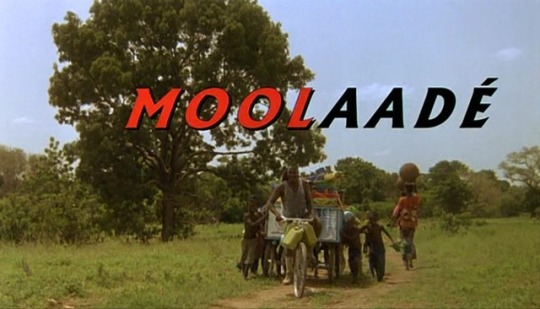

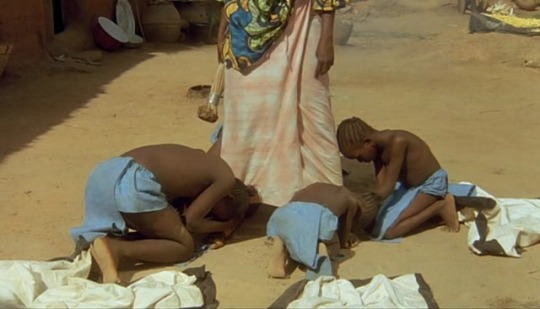

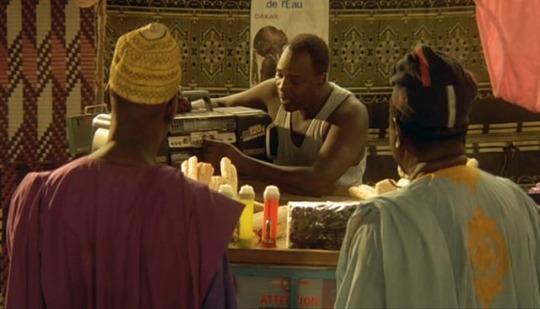
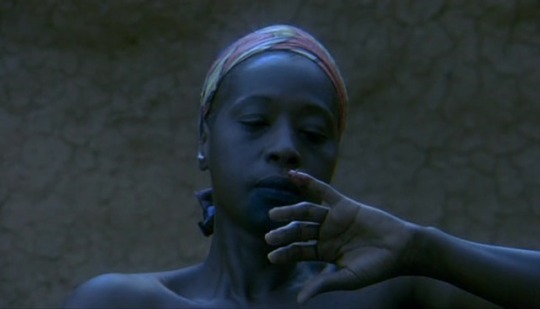
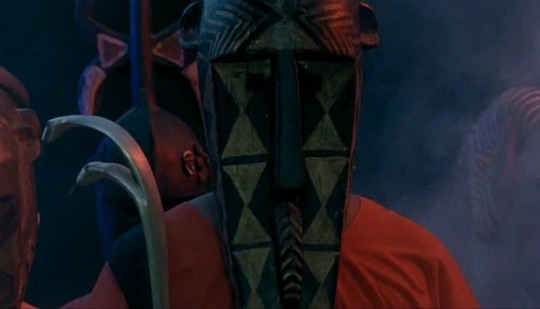
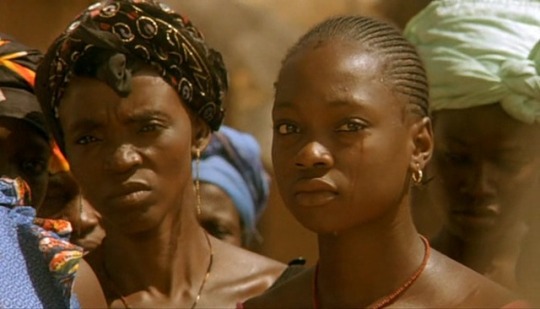
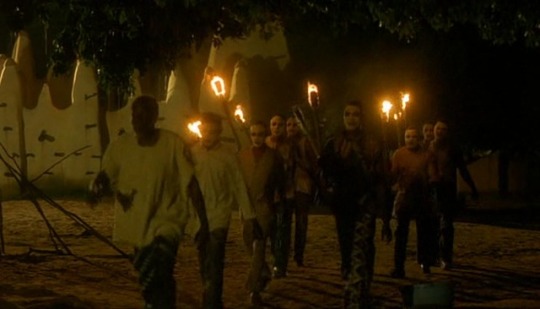
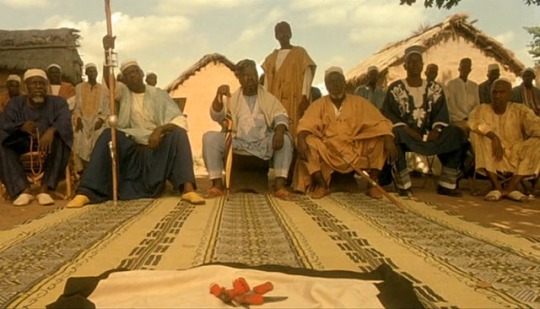
Moolaadé (2004), Director - Ousmane Sembene, Cinematography - Dominique Gentil "It takes more than a pair of balls to make a man." story about the scourge of female genital mutilation and a woman who rallied her village to fight it
#scenesandscreens#ousmane sembene#moolaadé#moolaade#Fatoumata Coulibaly#Maimouna Hélène Diarra#Salimata Traoré#Dominique Zeïda#Mah Compaoré#Aminata Dao#Rasmané Ouédraogo#Ousmane Konaté#Bakaramoto Sanogo#Modibo Sangaré#Joseph Traoré#Théophile Sowié#Habib Dembélé#Mariama Souabo#Mamissa Sanogo#Lala Drabo#Assita Soura
428 notes
·
View notes
Video
tumblr
"Moolaade" is the kind of film that can only be made by a director whose heart is in harmony with his mind. It is a film of politics and anger, and also a film of beauty, humor, and a deep affection for human nature. Usually films about controversial issues are tilted too far toward rage or tear-jerking. Ousmane Sembene, who made this film when he was 81, must have lived enough, suffered enough and laughed enough to find the wisdom of age. I remember him sitting in the little lobby of the Hotel Splendid in Cannes, puffing contentedly on a Sherlock Holmes pipe that was rather a contrast with his bright, flowing Senegalese garb.
His film is about, and against, the custom of female circumcision, practiced in many Muslim lands (although Islamic law forbids it). Does that make you think you don't want to see it? Think again. Sembene embodies his subject so deeply with his characters, and especially with his heroine Colle, that it becomes a story about will, defiance, and ancient custom.
It is never actually too specific about what would be done to the four girls who flee to Colle for moolaade, or protection. Sembene trusts us to know. He doesn't exploit blood-drenched horror scenes, and his approach is actually more effective because he limits himself to off-screen cries, or a brief glimpse of the knife used by the village's doyenne des exciseuses, the woman in charge of circumcisions. The knife is very small, wickedly hooked, hardly seen, and more frightening than a broadsword. Yet we learn that women support the removal of the clitoris because no man will marry a bride who has not been "cut." The actress Fatoumata Coulibaly, who plays Colle, has said that she herself was circumcised; the result, as with most victims, was an absence of sexual pleasure, and often pain during sex.
Why would a man insist on this mutilation? Perhaps out of deep insecurity and a distrust, even fear, of women. But "Moolaade" makes no such sweeping charges, and observes how the women themselves enforce and carry out the practice -- because, of course, they want their daughters to find husbands.
Colle has refused to let her own daughter be cut, but now the girl is engaged to a man returning home from France. Will Europe have freed him of ancient barbarities, or will he demand a bride who has been cut? Since the village hopes for wealth from the returning man, there is social pressure on Colle. And just at that moment, the girls on the brink of adolescence run weeping to Colle and beg for shelter in the compound she shares with her husband and his other wives.
Colle evokes moolaade. She ties a string of yarn across the doorstep of her house, and the law says that as long as the girls stay inside, no one can enter after them. Her husband is enraged. He loses status in the village council because he cannot control his woman, but his Number One Wife supports Number Two, and he is stalemated. One of the themes coiling beneath the surface of the film is that the women in this society have great power, if they are bold enough to exercise it.
Another theme is suspicion of the West, of modernization, of the outside in general. One of the ways groups create their identities is by enforcing costume rules that conceal individuality and impose a monolithic look. Uniforms are a way of saying that those who wear them are interchangeable. One who is obviously an outsider is le mercenaire, the itinerant peddler who visits the village to sell pots and pans, postage stamps, T-shirts and toys, and to pick up and deliver mail. He has a lively eye for pretty women, suggests secret rendezvous, and in general ignores the code that a woman belongs to a man.
Among the most important items in his stock are batteries, needed for portable radios and flashlights in this district without electricity. The radio stations are in the cities, and broadcast words and music reflecting dangerous freedoms. When the frustrated all-male village council meets to ponder the challenge of Colle and moolaade, it doesn't occur to them, of course, that women might have perfectly good reasons for not wanting to be circumcised. They blame the outside. The radios. They order a sweep of the village to confiscate all the radios, which are deposited in a big pile, some of them still turned on. This pile becomes a central image of the film, and inevitably evokes bonfires of hated books, or videos, or rock 'n' roll, or people.
The construction of Sembene's film is subtle and seductive. He spends little time denouncing female circumcision, and a great deal of time studying the human nature of dissent and conformity. There is humor in the paradoxes that the men debate, and in their impotence against their women, and suspense when the prodigal son returns from Paris. On the most fundamental of levels, this is an entertaining film. Also a beautiful one, as we admire the artistry of the architecture, and appreciate how the people of the village live within the rules and respect them, even when opposing them. These people, despite some of their practices, are deeply decent and civilized, and Sembene loves them for it. The movie contains less outrage than regret.
Sembene's death at 84, on June 9, 2007, brought to a close an extraordinary life, one that parallels in some ways Nelson Mandela's. Neither was born into wealth and privilege, and both achieved greatness. Although he was known for years as "the father of the African cinema," and wrote six novels before he decided films would reach a larger audience, Sembene as a young man (I learn from IMDb.com) was a mechanic, a bricklayer, a soldier for the Free French, a labor leader, an autoworker and a stevedore. His first novel came in 1956, his first movie ("Black Girl") in 1966.
That film told the story of the ill treatment a young Senegalese woman finds when she goes to work as an au pair in Paris. But Sembene did not devote himself to dramatizing the evils of whites against blacks on his continent. He was more interested in drama, conflicts and comedy within the vibrant African civilization.
Consider his wonderful film "Guelwaar" (1992). In his country, Muslims live side-by-side with Catholics, and his story involves a mix-up that accidentally results in the burial of a Catholic body in a Muslim cemetery. When an attempt to move the body is made, the Muslims are outraged -- not because the body is there, but because the removal would desecrate the cemetery. A local policeman, himself a Muslim, tries to defuse the situation and prevent a nasty fight.
This story could involve stereotypes and fan the flames of prejudice. But not with Sembene. He portrays all the characters as people who are reasonable, by their own lights, and would be content with a solution that did not violate their beliefs. And all religions contain a fuzzy area that allows common sense to sometimes win over dogma. All it takes here is a persuasive policemen, and some wise people on both sides who are weary of the hotheads.
Sembene's work so often dealt with his society from the inside, with sympathy, insight, and the sly wit of a Bernard Shaw. He made political films that didn't seem political, and comedies that were very serious. His regret was that many of his films, including "Moolaade," were not welcome in Africa. He won awards at Venice, Karlovy Vary and many other important festivals; "Moolaade" won first place in the Un Certain Regard section at Cannes. But according to IMDb, the film has played nowhere in Africa except Morocco. The message is not heard where it is needed.
Ousmane Sembene was born into an Africa where a black man was not expected to write novels or direct films. He dedicated his life to making brave and useful films that his continent needed to see. He did that even knowing they would probably not be seen. They exist. They wait. They honor his memory.
Note: Most of Sembene's films are available on DVD
#africa#senegal#ousmane sembene#moolaade#fatoumata coulibaly#maimouna hélène diarra#salimata traoré#dominique zeïda#mah compaoré#aminata dao#rasmané ouédraogo#ousmane konaté#bakaramoto sanogo#modibo sangaré#joseph traoré#théophile sowié#habib dembélé#gustave sorgho#cheick oumar maiga#sory ibrahima koïta#aly sanon#moussa sanogo#naky sy savane#stéphanie nikiema#marie yameogo#mabintou baro#tata konaté#fatoumata sanogo#madjara konaté#fatoumata konaté
0 notes
Text
Justice in Minnesota / Injustice in Paris
A native of Lod, Rabbi Joshua ben Levi was one of the greatest scholars in the Land of Israel in the first half of the third century BCE. Not too much is known of his family other than that he had a son named Joseph, who later grew up to become a rabbi like his father and to marry the daughter of Rabbi Judah, Patriarch of the Jewish community. But before Joseph grew to adulthood and achieved rabbinic ordination, it once happened that he fell terribly ill and sunk into a kind of coma during which he had vivid hallucinations. It lasted for days, but eventually he came out of it and, when he did, his father asked him what he had seen in the course of those hours spent in hallucinatory delirium. “I saw a topsy-turvy world,” Joseph reported, a crazy place in which things were the opposite of what they really are: “the things that belong on top were all on the bottom and vice versa—the things that belonged down below were all up on high.” Rabbi Joshua listened carefully to his son’s report about the olam hafukh, the topsy-turvy world that had been so prominently featured in his comatose dreamscape. And then he gave his considered, now famous, answer, “My son,” he said, that wasn’t hallucination, it was insight, because there, in your protracted dream, “you saw things as they truly are in this world.”
For twenty centuries, students of Talmud have been discussing what Rabbi Joshua could have meant. But now, just this very week, the secret has finally been revealed: Rabbi Joseph must have been dreaming about France, my new candidate for the most topsy-turvy nation in the world, a place where criminals bear no responsibility for their deeds, where murder is not an actionable crime, where voluntary drug use can relieve even the most vicious criminals of any responsibility for their crimes, and where the fully intentional murder of an elderly Jewish physician, a woman whose entire professional life was devoted to helping others, can be deemed an unfortunate mishap, an inconsequential accident unworthy of adjudication in the courts. These would have constituted a shocking turn of events to consider in the course of any week at all. But coming in the course of the same week in which the American justice system showed itself capable of convicting a veteran police officer who was deemed responsible for the death of a citizen in his custody, it was especially hard to swallow.
I am thinking, of course, of the decision this week by the Court de Cassation, France’s highest appeals court, to accept a lower court’s decision not to try Kobili Traoré, 31, for the 2017 murder of Sarah Halimi. Ordinarily, this would not be a subject for discussion at all. The crime was as horrific as it was brutal. The details themselves, including the identity of the perpetrator, are not in doubt: Traoré, a neighbor of Mme. Halimi, forced his way into her apartment and beat her so severely for a full thirty minutes before shoving her out a window of her third-story apartment that one of the few details that remain unresolved with respect to the crime is whether the victim was already dead when pitched out her own window to crash-land on the street or whether she died upon impact. Nor is the motive for the murder in any sort of doubt: Traoré, an immigrant to France from Mali in West Africa, was motivated, to quote his psychiatric evaluation, by a “frantic outburst of hate” directed towards his victim because of her Jewishness. As she shoved her out the window, he was heard to have called out the Arabic words Allahu akbar (“God is great”) and “I have killed the devil.” More specifically, it seems that Traoré was particularly enraged by the daily sight of the mezuzah affixed to the outer doorway of Mme. Halimi’s apartment, its mute presence reminding him daily that he was forced to live under the same roof as a Jewish woman.
So if neither the details of the crime nor the identity of its perpetrator are in doubt, why would the Court de Cassation have confirmed a lower court’s ruling forbidding the government from putting Kobili Traoré on trial? The answer, they said, is simple: according to French law, “a person is not criminally responsible [for his or her own deeds if those deeds were done while their doer was] suffering at the time of the event from [the kind of] psychic or neuropsychic disturbance that eliminate [the possibility of] discernment or control” and which that person might otherwise have brought to bear to rein in his or her behavior. For Americans, that too sounds like a familiar concept: we too do not put mentally ill people unable to distinguish right from wrong on trial. Indeed, the famous outcome of Durham v. United States in 1954 to the effect that a defendant can avoid conviction if it can be demonstrated convincingly that the “unlawful act was the product of mental disease or mental defect” could hardly be more well known in our country.
But Kobili was not mentally ill in the way the term is normally used. Instead, his mental state—including his rage against his victim because of her ethnicity and faith and his willingness to express that rage brutally and sadistically—had been brought on by himself through his intense use of cannabis. And so the court concluded that Mme. Halimi’s murderer could not stand trial for his deeds because he had self-stupefied before entering his victim’s apartment. The moral of the story: if you are planning to travel to France to murder someone, be sure to pack your bong along with your gun and your ammo!
It has been a difficult decade for the Jews of France. Many will remember the 2012 murder by an Islamic fanatic of three children and a teacher in a Jewish school in Toulouse. And it was just three years later, in 2015, that Amedy Coulibaly entered a kosher supermarket in Paris with the specific intention of murdering the four Jews he killed there because of his hatred of Jewish people. And then, just a year after Mme. Halimi was murdered, a different elderly woman, Mireille Knoll, was also murdered—she was stabbed to death—by a madman who targeted her specifically because of her Jewishness. Those cases, it is true, were duly prosecuted and the defendants found guilty. But, even so, this week’s decision by the Court de Cassation, in effect excusing Mme. Halimi’s murderer from prosecution because of his voluntarily, intentional, and—it turns out—exceptionally well-timed drug use, was something that struck many onlookers as bizarre and more than slightly menacing.
The responses to the court’s decision have been angry. One of the public prosecutors on the case referred to the court’s decision as a gift of “complete impunity” to the murderer. Shimon Samuels, director for international affairs of the Simon Wiesenthal Center, wrote that the court’s decision “potentially creates a precedent for all hate criminals to simply claim insanity or decide to smoke, snort, or inject drugs, or even [just] get drunk, before committing their crimes.” Even Emmanuel Macron, President of the French Republic, got into the act, calling for a swift change to the law to avoid the possibility of murderers going free after claiming that their own intentional drug use rendered them incapable of understanding the gravity or consequences of their own deeds. “Deciding to take narcotics and then going ‘like crazy’ should not in my eyes remove your criminal responsibility,” the President said clearly and unambiguously.
But future changes in the law will come too late to bring Sarah Halimi’s killer to justice. And that too seems to be universally understood by all concerned parties in France and abroad.
There is something logical and just about the basic notion that people unable to understand the consequences of their own actions should be treated kindly and mercifully by the criminal justice system. We treat children differently than adults in that regard, and for the same reason. As well we should, too—I don’t think anyone is arguing against that principle, which pertains not only in the U.S. and in France but in all enlightened countries of the world, nor would any normal person. But to extend that thought to include people who intentionally drug themselves to the point at which they can argue later on that they should not be held responsible for their own actions—that seems to me like the extension of a logical idea into the realm of true craziness. Kobili Traoré murdered Sarah Halimi because he found her existence as a Jewish woman offensive to the point of being unbearable. And, yes, he acted on his deeply anti-Semitic beliefs in a way that he might have not done had he not been high. But to conclude that the man should reasonably escape prosecution, conviction, and punishment because he willingly set himself outside the boundaries of culpability and responsibility through drug use—that seems to me to skate far too close to excusing the basic principle upon which all just criminal laws lies: that people who can tell right from wrong should be obliged to take responsibility for their own actions.
Sarah Halimi will rest in peace because she lived a decent, good life. She was the mother of four and a former physician, an older woman living a peaceful life in retirement. Why shouldn’t she rest in peace? But that her murderer will apparently legally avoid having to take any responsibility for her death—that seems to me to constitute an outcome wholly at variance with the facts of the case under consideration. I believe that justice was done for George Floyd this week in Minneapolis. I wasn’t sure how things would turn out, but the bottom line is that the basic principle that individuals, even police officers, must take responsibility for their own actions was upheld and affirmed. It’s too bad Paris isn’t in Hennepin County, Minnesota!
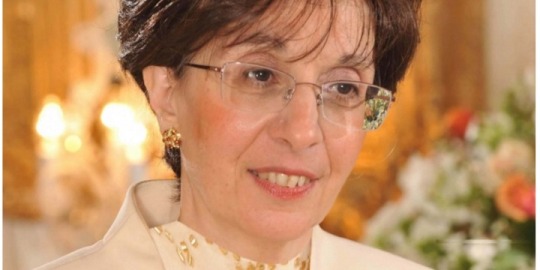
0 notes
Text
Comité interparlementaire du G5 Sahel : le secrétaire exécutif se présente au Premier ministre
Comité interparlementaire du G5 Sahel : le secrétaire exécutif se présente au Premier ministre
Le Premier ministre, Christophe Joseph Marie Dabiré, a reçu en audience, le Secrétaire exécutif du Comité interparlementaire du G5 Sahel, Karamoko Jean Marie Traoré, le 19 janvier 2021. Le Secrétaire exécutif du Comité interparlementaire G5 Sahel, Karamoko Jean Marie Traoré a pris officiellement fonction, le 25 février 2020. Près d’une année après, il a jugé opportun de se présenter au Premier…

View On WordPress
0 notes
Photo

Maminata Coulibaly/Traoré native de KANKALABA dans la province de la LÉRABA est nommée ministre déléguée auprès du ministre de l’Enseignement supérieur, de la Recherche scientifique et de l’Innovation. Chercheure à l’Institut de recherche en science de la santé ( IRSS), Maminata Coulibaly née Traoré fait ses premiers pas en politique dans le deuxième gouvernement de Christophe Dabiré. Ainsi, c’est auprès de son collègue de la recherche, le Pr Alkassoum Maïga, qu’elle est nommée au poste de ministre déléguée auprès du ministre de l’Enseignement supérieur, de la Recherche scientifique et de l’Innovation, chargée de la Recherche scientifique et de l’Innovation. Ancienne étudiante de l’Université de Ouagadougou devenue l’Université Joseph Ki-Zerbo et à la Faculté danoise des sciences pharmaceutiques de l’Université de Copenhague, Maminata Coulibaly a mené une cinquantaine de projets en tant qu’enquêtrice et co-investigatrice. Depuis plusieurs années, elle mène également des recherches axées sur les maladies infectieuses, l’évaluation préclinique et la clinique des médicaments sans oublier les phytomédicaments et la biochimie. Poste académique et administratif Au niveau des postes de responsabilités, Maminata Coulibaly ne semble pas être sur un terrain inconnu. Car elle a occupé plusieurs postes de responsabilité. C’est ainsi que depuis 2018, elle est directrice de recherche au conseil malgache pour l’enseignement supérieur. Sur le plan administratif, la chercheure est depuis 2016 directrice scientifique de la direction Régionale de l’IRSS (institut de recherche en science de la santé) basée à l’Unité de Recherche Clinique de Nanoro. Outre ces postes, elle est également membre du comité national d’éthique sanitaire (CERS) depuis 2013-2020 et a été cheffe du Département « Études et Suivi-Évaluation » de 2014 à 2016. Toujours au plan administratif, Maminata Coulibaly a été membre du comité technique du forum africain de règlementation des vaccins (AVAREF) à l’OMS de 2016 à 2020, etc https://www.instagram.com/p/CJ8JmynlH_R/?igshid=d9yx1aas0rdj
0 notes
Text
Décret : Les magistrats de la 5ème promotion du Centre de Formation Judiciaire nommés

Dans un autre décret lu à la télévision nationale ce jeudi 17 septembre, le président de la République Alpha Condé a procédé à la nomination des magistrats de la cinquième promotion du Centre de Formation Judiciaire (CFJ).
Au Tribunal de Première Instance (TPI) Kaloum, Fadouwa Mansaré et Mamadou Saliou Diallo ont été nommés juges. Au TPI de Dixinn ce sont Alpha Camara et Aboubacar Tino Camara qui ont été nommés juges. Quant au TPI de Mafanco, Diomandé Condé, Mamadi 2 Magassouba et Saydou Doumbouya ont été nommés juges. Mamadou Hawa Barry et Fanta Alama Camara ont été nommés juges du Tribunal pour Enfants Dans le même décret, Mamadou Hady Diallo a été nommé substitut du Procureur.
Au TPI de Coyah, Amadou Oury Barry, Elhadj Ibrahima Bah et Joséphine Béavogui ont été nommés substituts du procureur de la République.
TPI Dubréka, substituts du procureur de la République Sékou Sangaré, Ramatoulaye Barry et Saikou Yaya Barry
TPI de Forécariah, substituts du procureur de la République, Léon Milimono et Moussa 2 Keita
TPI de Kindia, substituts du procureur de la République Elise Doua Guilavogui, Ibrahima Camara et Jean Pierre Tolno
TPI de Boké, substituts du procureur de la République Moussa 2 Traoré, Simon Pierre Milimono.
TPI de Mamou, substituts du procureur de la République Mohamed Aly Condé et Damba Oularé.
TPI de Ladé substituts du procureur de la RépubliqueMoussa 1 Koné et Pierre Kolié.
TPI de Pita, substituts du procureur de la République Sogo Soua Gomou et Alhassane Diallo.
TPI de Koundara, substituts du procureur de la République Biho Léno, Ibrahima Bah et Mamadou Saliou Baldé.
TPI de Faranah, substituts du procureur de la République Amara Camara et Mohamed Keita.
TPI de Kankan, substituts du procureur de la République Kolou Kadiatou Guilao, Boubacar Zélaba Diallo, Bangaly Feindouno. TPI de Siguiri, substituts du procureur de la République Zano Elvis Doré et Boubacar Sila Bah. TPI de Kéréouané, substituts du procureur de la République Fanga Oularé, Dio Joseph Tinguiano et Jacob Pogba Bilivogui. TPI de Kissidougou, substituts du procureur de la République Doussouba Mamoudou Condé et Ibrahima Kallo. TPI de Macenta, substituts du procureur de la République Philippe Gonga Mamy et Lancinè Bérété.
TPI de Nzérékoré, substituts du procureur de la République Mariama Camara et Zakaria Coket Camara.
0 notes
Text
Bernard Arthur thanks Hearts of Oak in emotional message
[caption id="attachment_705346" align="alignnone" width="570"] Bernard Arthur has signed for Hearts of Oak[/caption] Former Hearts of Oak forward Bernard Arthur has sent a heartwarming goodbye message to the team and supporters after parting ways with the clubs. Arthur, 23, joined Hearts of Oak on a free transfer in August 2019 but failed to impress at the club. The Embittered Hearts of Oak attacker desperately wanted to exit the club after suffering what he terms neglect and disrespect from head coach Edward Nii Odoom due to lack of game time. He confirmed an imminent move to Great Olympics during the course of the season. The former Liberty Professionals forward was part of a list of four players, Benjamin Agyare, Christopher Bonney, Aboubacar Traoré, Bernard Arthur and most notably Joseph Esso who were released by the Ghanaian giants following the expiration of their contract on Friday. Arthur finally has his freedom and has thanked the club for their services and his short stint with them. "I would like to thank the Board of directors,Coaching staff and the players for the few time spent with them. “You can’t win always in life but even when loosing you opt to loose with a significant. I wish #AccraHeartsOfOak all the best and bring the spirit of the club back like I did for you against Liberty professionals". source: https://ghanasoccernet.com/
0 notes
Link
When London-based lawyer and women’s-rights activist Shola Mos-Shogbamimu first heard the news of George Floyd’s killing on May 25, her gut reaction was raw anger. “George Floyd was every black person in that video,” she says. “Every one of us can identify with that knee on our necks, not letting up, with that pressure increasing until it suffocates us.”
Floyd’s final words, “I can’t breathe,” have been emblazoned on placards and chanted by crowds from Sydney to Cape Town, Paris to Seoul, who have gathered in global solidarity protests since May 30. “We’re trying to show that despite being bombed and losing people and then being called terrorists, we still feel empathy. We still feel for people like George Floyd who are being oppressed in other parts of the world,” says Syrian artist Aziz Asmar, who painted a mural of Floyd on the remnants of a bombed building in Idlib.
With the coronavirus pandemic laying bare systemic inequalities and racial discrimination, people around the world are seizing the moment to push for change in their own countries. As they stand in solidarity with protesters in the U.S., they’re also calling for a reckoning with past and contemporary injustices in Europe and the Pacific region. “Historically it’s a different journey,” says British community activist Patrick Vernon. “But it’s still the same impact: structural racism, stop and search, poverty, exclusion.”
In some countries, common ground with the U.S. is not hard to find. In France, where young Arab and black men are 20 times as likely as white men to be stopped by police, thousands of people have taken to the streets of Paris, Marseilles, Lyon and Lille. Many are protesting in the name of Adama Traoré, a 24-year-old Malian-French man who died in police custody in 2016. While police say officers are not responsible for his death, an independent autopsy commissioned by Traoré’s family ruled on June 2 that he died of asphyxiation as a result of violent arrest. In Paris, his sister called for justice, telling crowds, “What is happening in the United States has today brought to light what is happening in France.” On June 8, as pressure mounted, France announced a ban on choke-hold arrest tactics.
The protests have also struck a chord in Australia and New Zealand, where black and indigenous communities are protesting the disproportionate levels of policing and violence they face. “We marched to defend Black Lives overseas and to fight for our own lives against our own racist police,” campaign group Arms Down NZ told TIME in a statement after marches took place in several cities across New Zealand on June 1. In Australia–where aboriginal and Torres Strait Islander prisoners account for 28% of the prison population, despite making up just 3.3% of the total population–tens of thousands marched nationwide on June 6 against racial profiling and police brutality.
Meanwhile, at London protests on June 6 and 7, a chant of “The U.K. is not innocent” took aim at those who claim racism is uniquely bad in the U.S. In Britain, black people are nearly 10 times as likely as their white counterparts to be stopped and searched by police, according to police statistics. “As black and minority people, we’re more at risk if we are infected with COVID,” said Landa George, who wore a mask as she protested in London’s Parliament Square on June 6. “We’ve got more at stake because we’re actually here.”
Many activists are hopeful about the current moment, saying it presents an opportunity to address historic in-equalities. On June 7, protesters in Bristol, England, pulled down a 125-year-old statue of slave trader and philanthropist Edward Colston and threw it into the city’s harbor. In Belgium, statues of King Leopold II, who oversaw the murder of an estimated 10 million Congolese, were vandalized in June. A statue of King Leopold in Antwerp was removed permanently on June 9 after being lit on fire and damaged the previous week. “The protesters were doing an incredible job in calling out King Leopold for what he is: a colonizer and a genocider,” says Brussels-based scholar Adeola Aderemi.
At Oxford University, campaigners have been fighting since 2015 to remove a statue of British imperialist Cecil Rhodes from the campus, inspired by the Rhodes Must Fall movement in South Africa. And amid calls to address past injustices, London Mayor Sadiq Khan announced on June 9 a review of the city’s landmarks and said that all statues and street names with links to “slavery should be taken down.” That same day, a statue of slave trader Robert Milligan was removed from its plinth in London’s West India Docks to “recognize the wishes of the community,” said the U.K.’s Canal and River Trust.
“There’s really an opportunity for everyone to critically reflect on a racist and racialized past,” the organizers of Rhodes Must Fall in Oxford said in an interview. Now, with black lives matter protest placards lying where Colston’s statue once stood in Bristol, that reckoning with the past is meeting the urgency of the present.
–With reporting by Joseph Hincks/Istanbul, and Mélissa Godin and Billy Perrigo/London
0 notes
Video
youtube
Hi, dears don't forget like & subscribe to receive highlights and full match videos for all leagues and cups. Enjoy. Click here for subscribing in our channel: http://bit.ly/2O69L1Y ------------------------------------------------------------------------------------------------- Join us in: FACEBOOK : https://ift.tt/30LqU2k TWITTER : https://twitter.com/tube_highlights -------------------------------------------------------------------------------------------------- Key Events 90'+3' End Regular Time 75' On: Boubacar Fofana | Off: Houssem Aouar 66' On: Amine Gouiri | Off: Moussa Dembélé 65' Substitution, Lyon. Oumar Solet replaces Joachim Andersen. 63' On: Kenny Tete | Off: Léo Dubois 63' On: Yann Kitala | Off: Bertrand Traoré 63' On: Maxence Caqueret | Off: Memphis Depay 63' On: Harvey Elliott | Off: Bobby Duncan 63' Substitution, Liverpool. Alex Oxlade-Chamberlain replaces Harry Wilson. 62' Substitution, Liverpool. Divock Origi replaces Rhian Brewster. 62' Substitution, Liverpool. Fabinho replaces Adam Lallana. 62' Substitution, Liverpool. Jordan Henderson replaces James Milner. 62' Substitution, Liverpool. Simon Mignolet replaces Alisson. 62' On: Andrew Robertson | Off: Yasser Larouci 62' Substitution, Liverpool. Virgil van Dijk replaces Sepp van den Berg. 62' On: Joël Matip | Off: Dejan Lovren 62' Substitution, Liverpool. Trent Alexander-Arnold replaces Joseph Gomez. 62' On: Georginio Wijnaldum | Off: Adam Lewis 53' Harry Wilson Goal 45' On: Lucas Tousart | Off: Thiago Mendes 45' Substitution, Lyon. Ciprian Tatarusanu replaces Anthony Lopes. 45' On: Marcelo | Off: Jason Denayer 45' Substitution, Lyon. Pape Cheikh replaces Jean Lucas. 45' Substitution, Liverpool. Adam Lewis replaces Naby Keita. 45' On: Sepp Van Den Berg | Off: Ki-Jana Hoever 45' Substitution, Liverpool. Bobby Duncan replaces Mohamed Salah. 45' Start 2nd Half 45'+1' Halftime 38' Ki-Jana Hoever Yellow Card 31' Substitution, Liverpool. Rhian Brewster replaces Roberto Firmino. 30' Substitution, Liverpool. James Milner replaces Xherdan Shaqiri. 22' On: Rafael | Off: Fernando Marçal 21' Own Goal by Joachim Andersen, Lyon. Liverpool 2, Lyon 1. 17' Goal! Liverpool 1, Lyon 1. Roberto Firmino (Liverpool) left footed shot from the left side of the box to the bottom right corner. 4' Goal! Liverpool 0, Lyon 1. Memphis Depay (Lyon) converts the penalty with a right footed shot to the bottom left corner. 3' Alisson (Liverpool) is shown the yellow card for a bad foul. - First Half begins. Liverpool,liverpool vs olympique lyonnais,2019,Highlights,Liverpool vs Lyon,Liverpool vs Lyon Highlights,31/07/2019,All Goals u0026 Highlights,lyonnais,Lyon,3-1,Liverpool vs Lyon 3-1 liverpool vs lyon,liverpool vs lyon highlight,liverpool vs lyon 2019,liverpool vs,lyon vs,lyon vs liverpool,liverpool lyon,liverpool lyon highlight,mane,van dijk,Liverpool vs Lyon resumen,Liverpool vs Lyon goal,Mohamed Salah vs lyon,Roberto Firmino
0 notes
Text
Des universitaires venus du Sénégal, Niger, Bénin, France, Canada et du Burkina Faso ont revisité, ce jeudi 21 février 2019, l’œuvre du défunt cinéaste burkinabé Idrissa Ouédraogo (1954 – 2018) à travers un colloque international en hommage au réalisateur organisé à l’université Ouaga 1 professeur Joseph Ki-Zerbo.
Pour l’universitaire sénégalaise Hadja Maïmouna Niang, ‘’le cinéma de Idrissa Ouédraogo même s’il est ancré sur l’esthétique a une forte dose d’engagement social’’.
This slideshow requires JavaScript.
‘’Quand vous suivez les films de Idrissa Ouédraogo, vous vous dites que ce sont des films esthétiques comme +Yaaba+ (1989) ou +Tilaï+ (1990), c’est l’art pour l’art. Et lui disait qu’il fait seulement des images, (…). Mais au fond, à travers son cinéma, on voit qu’il était engagé socialement pour sa communauté’’, explique Hadja Maïmouna Niang.
Selon elle, Sembène faisait un cinéma ‘’militant’’, mais ‘’Idrissa faisait ce que j’appelle du +Trompe l’œil+’’, car au-delà des images, il y avait toujours cet engagement pour la communauté’’.
L’universitaire de Thiès qui a axé sa communication sur le sujet ‘’A la recherche de la maternité de +Samba Traoré+ de Idrissa Ouédraogo réalisé en 1993 au regard de +Borom sarret de Sembène Ousmane datant de 1963’’ relève l’actualité du problème de maternité en Afrique.
‘’Entre les films +Samba Traoré+ et +Borom sarett+ qui ont vingt ans d’intervalle, on traite une séquence similaire où la femme est transportée à bord d’une charrette pour la maternité. Aujourd’hui encore, à travers les journaux télévisés, on voit des femmes réclamer la construction de maternité. De 1963 à 1993 et jusqu’à en 2019, on est au même point en Afrique. Ces cinéastes sont en phase avec l’actualité de leur continent’’, indique-t-elle.
Ses collègues Andrée-Marie Diagne Bonané de la Faculté des sciences et technologies de l’éducation et de la formation (FASTEF) et Fatou Ndoye Fall de l’université de Bambey ont à travers leur communication intitulée ‘’l’Africanité par et pour le cinéma’’ montrer que le ‘’cinéma de Idrissa Ouédraogo est nourri des réalités africaines’’.
‘’Le cinéma de Idrissa Ouédraogo enfonce ses racines dans les réalités africaines. D’abord la réalité de son ethnie, il est Mossi, sa région natale Banfora, mais aussi du Burkina Faso et de toute l’Afrique puisqu’il a fait des films en Côte d’Ivoire, en Afrique du Sud. (…), à travers les costumes, la coiffure, le mode d’habitat…, on le retrouve dans sa filmographie’’, note Mme Diagne maitre de conférence à la FASTEF.
Elle souligne que ‘’Idrissa Ouédraogo un des plus grands cinéastes africains a voulu un primitivisme qui est une certaine Afrique avant la colonisation, c’est une société qui a son harmonie et ses règles très strictes, mais qui était équilibrée et les gens y trouvaient leur bonheur’’.
Toutefois, relève Andrée-Marie Diagne Bonané d’origine burkinabé, ‘’Idrissa Ouédraogo a montré que l’Afrique était en contact avec la modernité dans +Yam Daabo+ (1986) et +Le cri du cœur+ (1994) avec le thème de l’émigration’’.
Pour l’universitaire Fatou Ndoye Fall, ‘’Idrissa Ouédraogo a lutté pour le rayonnement de l’Afrique et des Africains en particulier comme ses aînés Léopold Sédar Senghor, etc. Avec l’image, il nous a montrés les réalités africaines, personne ne pouvait rester intact après les films de Idrissa’’, dit-elle.
Mais ce qui l’attire surtout dans la riche filmographie du défunt cinéaste est cette ‘’prise de position face aux blancs’’.
‘’En un moment, il a reconnu vouloir faire comme le blanc, l’imiter et avoir une certaine reconnaissance, mais au fur et à mesure que son art murissait, il s’est imposé avec ce refus intellectuel d’une globalisation. Il dit qu’il n’y pas un cinéma africain, mais des cinémas africains. Il est un modèle pour les cinéastes’’, souligne Fatou Ndoye Fall professeur de Lettres modernes.
D’autres témoignages ont été livrés sur l’homme et son œuvre devant sa veuve, Sanata Ouaédraogo, le ministre de la Culture du Burkina Faso, Abdoul Karim Sango et le délégué général du FESPACO, Ardiouma Soma.
Pour le professeur Joseph Paré, président du comité scientifique, le colloque hommage à Idrissa Ouédraogo, une initiative du Laboratoire langue, discours et pratiques artistiques (LADIPA), organisé à quelques jours avant la célébration du cinquantenaire du FESPACO est ‘’une contribution de la communauté universitaire à la réflexion sur le devenir du cinéma africain’’.
Le cinéaste Idrissa Ouédraogo disparu le 18 février 2018 à l’âge de 64 ans est auteur de plus d’une quarantaine de films dont certains ont été distingués à travers le monde.
Il s’agit de ‘’Yaaba’’ qui a obtenu en 1989 le prix de la critique au festival de Cannes. En 1990 le film ‘’Tilaï’’ décroche le Grand prix du jury au festival de Cannes et un an plus tard remporte l’Etalon d’or de Yennenga à la 12 édition du festival. C’était alors le premier Etalon du Burkina Faso.
Documentaire, docu-fiction, série-télé, le réalisateur burkinabé a exploré tous les genres cinématographiques et s’est investi dans tous les domaines du cinéma (réalisateur, producteur, exploitant et formateur).
Fatou Kiné SENE
Des universitaires revisitent l’œuvre du défunt cinéaste burkinabé Idrissa Ouédraogo (1954 – 2018)
0 notes
Text
les leçons du match Mali-Cameroun - Cameroon Radio Television
les leçons du match Mali-Cameroun – Cameroon Radio Television
This article was originally posted in Cameroon Radio Television [ad_1]
Les Lionnes Indomptables sont venues à bout des Aiglonnes, 2 buts à 1, mais ce Mali-Cameroun aurait pu être fatal pour Christine Manie et ses coéquipières. Le coach Joseph Ndoko tire les leçons d’une rencontre pleine de surprises.
Aïssata Traoré, la courageuse buteuse Malienne de la rencontre Mali-Cameroun éprouve…
View On WordPress
0 notes